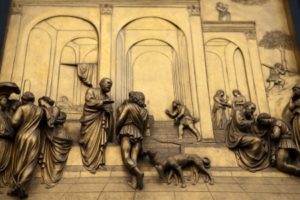
In Sunday School we reviewed the life of Jacob and I was again struck by the strange encounter of Jacob and Esau, where Esau “despised his birthright” by trading it to Jacob for some red stew (Genesis 25:29-34). Surely there was more going on just that. And even if we grant that Jacob was more cunning and devious than Esau, surely he would have known the significance of selling his birthright. He couldn’t have been THAT stupid, could he? And even though Jacob was an opportunist, there wasn’t any trickery here, as there would be later when he stole Esau’s blessing. So what’s going on?
Let’s open with a look at the term “birthright,” since it seems to have had value to Jacob, but was of little significance to Esau. According to the Dictionary of Biblical Imagery, the birthright traditionally went to the firstborn son, meaning he would receive a double portion of the inheritance, the right to bear the family’s name and other privileges. This practice was also consistent with Deuteronomy 21:15-17, which expressly forbade favoritism to a younger, more beloved son when distributing an inheritance. What happened between Jacob and Esau would be a violation of the Mosaic Law—if they had lived under it.
However, this practice was not universal in the ancient Near East, and it does not seem to be how Jacob, Esau, Isaac and Rebekah understood the birthright tradition. At the time of the patriarchs, the inheritance of the “firstborn,” the birthright, seems to have been independent from the blessing and something the firstborn could sell to someone else, as Esau did. In his commentary, Kenneth Mathews pointed out that both Jacob and Esau assumed that Esau had the right to sell his birthright. Jacob demonstrated this when he required Esau to trade his birthright for some red stew. Esau showed the same understanding when he complained that Jacob had cheated him twice—first for the birthright and then by tricking him out of a blessing by their father (Genesis 27:36).
Esau’s willingness to give up his birthright is less puzzling if the birthright and blessing are seen as separate actions. Consider this. Esau comes home hungry and exhausted from hunting and asks Jacob for some of the “red” stew he has just prepared. Jacob then said for the first time, “Sell me your birthright now.” I think Esau initially thought Jacob was not serious, so he reached for some stew and said: “I am about to die; of what use is a birthright to me?”
Jacob then repeated his demand: “Swear to me now,” and Esau now saw Jacob was serious. The right move would have been to go elsewhere to satisfy his hunger. But what if he thought the future blessing, as the eldest son, would overrule selling his birthright? Esau knew he was his father’s favorite. Surely their father would not recognize Jacob’s lame attempt to “buy” his birthright. So Esau took an oath, ate his stew and bread, and then left.
And it seems that initially, Esau was right. When Isaac was old, and he could not see, he called Esau and told him to hunt game and prepare a delicious meal so that he may eat it and “bless you before I die” (Genesis 27:2-4). Rebekah overheard the two of them, and plotted with Jacob to trick her husband, so that Jacob instead of Esau would receive the blessing from Isaac. Even though Jacob had “bought” Esau’s birthright, it hadn’t been enough to position himself as the son who had the right to receive his father’s blessing. Isaac still intended to bless Esau, who would retain the rights and privileges that came with it. As an aside, while Isaac was a bit of a foodie, loving the game Esau would catch (Genesis 25:28), I wonder if the meal also had some role in the pending ritual where Isaac was to bless Esau.
It seems that Isaac and his family members all placed greater importance on the blessing than the birthright. We see this in three ways. First, in Esau’s easy agreement to trade his birthright to Jacob for some red stew. Second, in the cunning way that Rebekeh and Jacob tricked Isaac to have him think he was blessing Esau, when in fact he was blessing Jacob. They both went to a good bit of trouble and risk to trick Isaac. And third, Isaac felt he could not undo the blessing he gave to Jacob, even though he obtained it through trickery (Genesis 27:1-40).
The plots and counter plots in the story of Jacob and Esau highlight competitive and dysfunctional behavior worthy of a modern soap opera or reality TV show. Jacob surely had a take-no-prisoners attitude towards obtaining Esau’s position as head of the family and Rebekah supported him. Esau rested on the assurance of his rights as the eldest and the knowledge that he was his father’s favorite. Surely this was enough to overcome Jacob’s transparent attempt to rob him of his birthright. Why did this rivalry start?
Look at the prophecy given to Rebekah when she had a difficult time during her pregnancy in Genesis 25:22-23. It seemed as if the children she carried were fighting one another in her womb. She was told: “Two nations are in your womb, and two peoples from within you shall be divided; the one shall be stronger than the other, the older shall serve the younger.” What follows in Genesis suggests that Rebekah took this prophecy to heart. Both her actions and those of Jacob are consistent with attempts to fulfill the final the final clause of the prophecy: “the older shall serve the younger.”
But Isaac apparently dismissed the significance of the prophecy as an explanation for his wife’s problematic pregnancy. When Rebekah gave birth, she had twins. There was a reasonable explanation for his wife’s difficult time—she had been carrying twins. And Isaac seems to have seen the birth of twins as all about him.
Gordon Wenham in his Genesis commentary noted where the first son was held in particular esteem as the first fruits of his father’s strength. But God had granted Isaac a double portion of TWO sons! Jacob had a similar view of the significance of his firstborn son when giving his deathbed blessings: “Reuben, you are my firstborn, my might, and the firstfruits of my strength, preeminent in dignity and preeminent in power” (Genesis 49:3). Isaac saw Esau as having the birthright and attendant privileges of the firstborn from the beginning. Jacob was simply a sign of God’s favor upon Isaac and his willingness to fulfill what He said to Isaac in Genesis 26:4-5:
I will multiply your offspring as the stars of heaven and will give to your offspring all these lands. And in your offspring all the nations of the earth shall be blessed, because Abraham obeyed my voice and kept my charge, my commandments, my statutes, and my laws.
So when Jacob made him swear to sell his birthright for a meal, Esau knew it was a pathetic attempt on Jacob’s part that their father would never go along with. So he made a bargain that he knew would never be honored. Nevertheless, he showed contempt for his right as the firstborn in trading his birthright. As Gordon Wenham observed, “Esau has treated with flippancy something of great worth.”
Jacob was trying to grasp what wasn’t his to take—Esau’s birthright—because of how he and Rebekah interpreted the prophecy about him and Esau before their birth. Esau was flippant with something he should have treated with the respect and honor it deserved. He trusted in custom and tradition instead of God. Isaac was blind to the truth of the prophecy, at least until he realized that the person he had blessed was Jacob and not Esau (Genesis 27:28-40). Yet Jacob’s successful usurping of Esau’s blessing didn’t work.
Because of the animosity it caused between them, Jacob had to leave all he had schemed to obtain behind because Esau intended to kill him after their father died. In the end, Esau not only received the double portion of the firstborn, he also seems to have been given Jacob’s share because Jacob went to Rebekah’s brother Laban. What seems to have been intended as a shorter time period to let Esau cool down, turned into twenty years. It was on this journey that Jacob heard personally from the Lord, as had his father Isaac and his grandfather, Abraham (Genesis 28:13-15). He had been trying to grasp the wrong birthright.





